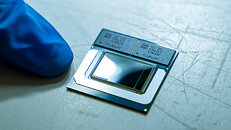- Joined
- Aug 19, 2017
- Messages
- 2,576 (0.97/day)
During a recent demonstration, Intel showcased its cutting-edge packaging technologies, EMIB (embedded multi-die interconnect bridge) and Foveros, unveiling the highly-anticipated Meteor Lake processor with integrated LPDDR5X memory. This move appears to align with Apple's successful integration of LPDDR memory into its M1 and M2 chip packages. At the heart of Intel's presentation was the quad-tile Meteor Lake CPU, leveraging Foveros packaging for its chiplets and boasting 16 GB of Samsung's LPDDR5X-7500 memory. Although the specific CPU configuration remains undisclosed, the 16 GB of integrated memory delivers a remarkable peak bandwidth of 120 GB/s, outperforming traditional memory subsystems using DDR5-5200 or LPDDR5-6400.
Nevertheless, this approach comes with trade-offs, such as the potential for system-wide failure if a memory chip malfunctions, limited upgradeability in soldered-down configurations, and the need for more advanced cooling solutions to manage CPU and memory heat. While Apple pioneered on-package LPDDR memory integration in client CPUs, Intel has a history of using package-on-package DRAM with its Atom-branded CPUs for tablets and ultrathin laptops. While this approach simplifies manufacturing, enabling slimmer notebook designs, it curtails configuration flexibility. We are yet to see if big laptop makers such as Dell, HP, and Asus, take on this design in the coming months.

View at TechPowerUp Main Site | Source
Nevertheless, this approach comes with trade-offs, such as the potential for system-wide failure if a memory chip malfunctions, limited upgradeability in soldered-down configurations, and the need for more advanced cooling solutions to manage CPU and memory heat. While Apple pioneered on-package LPDDR memory integration in client CPUs, Intel has a history of using package-on-package DRAM with its Atom-branded CPUs for tablets and ultrathin laptops. While this approach simplifies manufacturing, enabling slimmer notebook designs, it curtails configuration flexibility. We are yet to see if big laptop makers such as Dell, HP, and Asus, take on this design in the coming months.

View at TechPowerUp Main Site | Source



